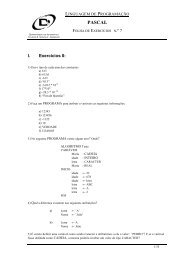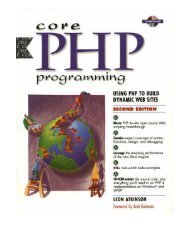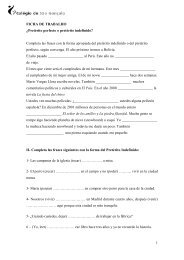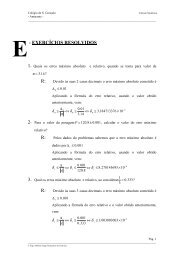O Guia Definitivo do Yii 1.1
O Guia Definitivo do Yii 1.1
O Guia Definitivo do Yii 1.1
Create successful ePaper yourself
Turn your PDF publications into a flip-book with our unique Google optimized e-Paper software.
forum/<br />
ForumModule.php<br />
components/<br />
views/<br />
controllers/<br />
DefaultController.php<br />
extensions/<br />
models/<br />
views/<br />
layouts/<br />
default/<br />
index.php<br />
the module class file<br />
containing reusable user components<br />
containing view files for widgets<br />
containing controller class files<br />
the default controller class file<br />
containing third-party extensions<br />
containing model class files<br />
containing controller view and layout files<br />
containing layout view files<br />
containing view files for DefaultController<br />
the index view file<br />
A module must have a module class that extends from CWebModule. The class name is<br />
determined using the expression ucfirst($id).'Module', where $id refers to the module ID<br />
(or the module directory name). The module class serves as the central place for storing<br />
information shared among the module code. For example, we can use<br />
CWebModule::params to store module parameters, and use CWebModule::components to<br />
share application components at the module level.<br />
Tip: We can use the module generator in Gii to create the basic skeleton of a new<br />
module.<br />
Using Module<br />
To use a module, first place the module directory under modules of the application base<br />
directory. Then declare the module ID in the modules property of the application. For<br />
example, in order to use the above forum module, we can use the following application<br />
configuration:<br />
return array(<br />
......<br />
'modules'=>array('forum',...),<br />
......<br />
);<br />
A module can also be configured with initial property values. The usage is very similar to<br />
configuring application components. For example, the forum module may have a property<br />
named postPerPage in its module class which can be configured in the application<br />
configuration as follows:










